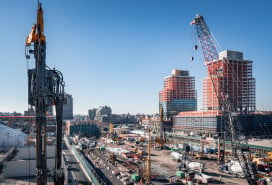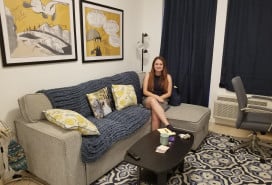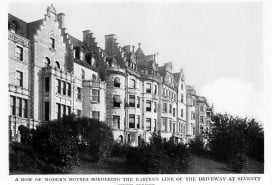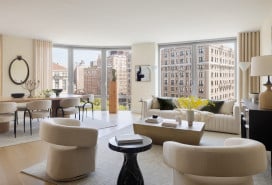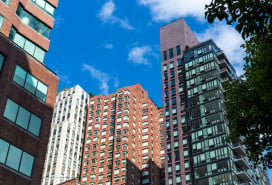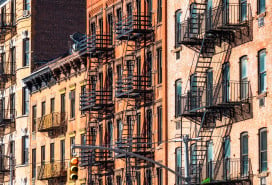The cost of silence in NYC? $8,000 a wall
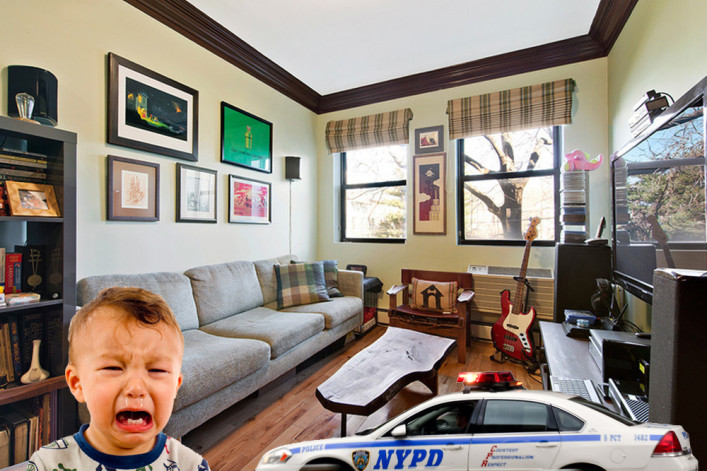
Sirens. Dogs. Late-night revelers. Screaming children. Construction. And the salsa dancer upstairs who practices in her combat boots. New York City apartment living can be very, very loud.
Nobody knows this better than Michael LaFratta, owner of Silentium Soundproofing, and an expert on urban noise. LaFratta tells us how we can all get a bit of peace and quiet.
What are the common complaints that drive people to soundproof?
The vast majority of calls we get are always related to some form of "noise pollution" caused by the lack of a soundproofing plan when a building was initially constructed.
This might include a noise from the elevator shaft that can be heard through walls, floors or ceilings. The sound of pipes whistling or creaking floors can be very annoying. Another typical complaint is related to people living in close proximity—people don’t want to hear someone else’s TV when they’re trying to watch in their own living room.
[Pro tip: If you're buying a new place, have your attorney check the board minutes for noise complaints, and if there are, find out how audible they are from your prospective place.]
Where do noise issues come from?
Most noise problems are deeply rooted in the design of how a structure was built. Builders don’t always consider sound, which is transferred easily when there is not enough mass and space between walls, ceilings or floors. And if the materials used to separate rooms are too thin, sound will transfer quickly.
It’s tough—but not impossible—to tell in advance if your building might have a noise issue. Your best way to find out is to spend time in the apartment when your neighbors are around. Too often, people look at potential living spaces in the middle of the day when neighbors usually aren’t home.
What are the worst building offenders for noise problems? Pre-war? Post-war?
It all depends on how the building was constructed. For example, some post-war buildings are new enough that they were able to incorporate sound isolation into the design, such as resilient channels [adding resilience, meaning space or insulation, to the walls and ceilings] and flex ducts [insulation-based duct work as opposed to rigid sheet metal duct work].

Resilient channel systems add space between walls and ceilings to alleviate sound transmission (Photo credit: Clark Dietrich)
However, assuming the walls are sealed, and there are no gaps around the perimeter of the wall, outlets and between bricks, a pre-war building is usually quieter than a post-war because the construction is heavier and there are fewer flanking paths, like holes for lighting and duct work. It will vary from building to building though.
What can be done for the worst problems?
Severe sound problems require breaking or minimizing the connection where most noise or vibration is transmitted. A sound professional can design a solution quickly and be more cost effective than merely trying to find a "one size fits all" solution.
Many of our clients did this [before they became clients], and it cost them several thousand and in some cases many thousands of dollars when they could have simply paid for a low-cost diagnosis and sound plan to take care of their sound problems.
Depending on the circumstances, sometimes walls, floors and ceilings have to be replaced so that a cavity can be made. Another solution would be to create a barrier of some sort, like a mass loaded vinyl barrier, depending on the noise issue. It really comes down to what the noise issue is and what it will take to minimize it as much as possible.

A mass loaded vinyl barrier can help with the worst sound problems (Photo credit: Amazon)
If you have a lot of outside noise coming in through the windows, we’ll usually add a single pane, 1/4-inch double hung window to the recessed wall where the window is. As long as you have enough depth, you can create an air space that will minimize the noise coming in from outside.
How much does all of this cost?
One hundred square feet of wall soundproofing typically ranges from $5,000 to $8,000. The same amount of ceiling ranges from $7,000 to $11,000, [on the higher end if] there's recessed lighting. Floors would follow similar to ceilings, in the $7,000 to $9,000 range.
How do customers get duped by soundproofers?
The devil is in the details and, unfortunately, some contractors cut corners to win a customer’s business. At the same time, clients have budgets and sometimes a contractor wants to accommodate the client.
Often the non-soundproofing expert will do research online and see an application and figure it’s pretty straightforward, which, in theory, it is.
However, depending on what else is going on with a particular noise issue, there tends to be other variables that come into play, such as metal ducts that are running through the dwelling, and some of the sound might be flanking from it. We call this a secondary pathway. This is an unexpected fix that adds to costs.
Another important factor is making sure any recessed lights that are in the ceiling are treated as well. The contractor may think the job is done only to discover the noise is still prominent and to correct it involves a considerable amount of money.
Experienced soundproofers build the unknowns into their bids, so the client is fully aware of what to expect. If the job is bid well, asking for more money to finish the job is significantly minimized and is often a non-issue.
In this business, I have discovered that it’s always better to create a partnership with the client and do a thorough estimate even if the costs seem high so the client can make an informed decision before investing.
Related posts:
NYC Renovation Qs: How can I soundproof my apartment?
Soundproofing my windows changed my life
Soundproofing to save your sanity: Affordable options for renters?
Second Avenue subway pain, as measured in soundproofed windows
Ask an Expert: The lowdown on soundproof windows
Secrets of a NYC window soundproofer: New York's noisiest neighborhoods and what can be done about them (sponsored)
Read this before you buy, rent or sell a noisy apartment
Top 10 reasons to soundproof your windows, besides the obvious (sponsored)





